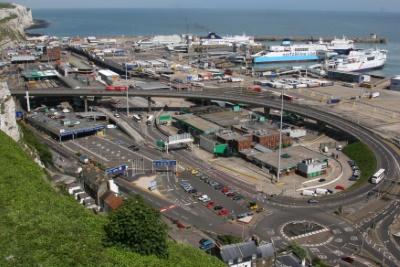RHA hosts border security summit following new report
 The Road Haulage Association (RHA) has hosted an international summit on human trafficking and border security for the road transport sector, after its recent publication of a new report on the subject.
The Road Haulage Association (RHA) has hosted an international summit on human trafficking and border security for the road transport sector, after its recent publication of a new report on the subject.
The RHA was joined on 1 October by numerous stakeholders from the UK, EU and USA – including transport operators, trade bodies including the IRU, and representatives from policing, the Department for Transport (DfT), Office of the Traffic Commissioner and the Home Office, as well as law firm Backhouse Jones and Truckers Against Trafficking.
“The conversations were open, honest, and at times challenging – exactly what this issue demands,” said Richard Smith, managing director at the RHA.
“We explored how different countries are responding to clandestine entry via commercial vehicles and human trafficking, and heard directly about the impact on people, businesses, and frontline agencies. We shared best practice and touched upon possible solutions.
“We also discussed our recently launched international report, Clandestine Entry in Road Transport and the UK Response, which brings together real-world insight and evidence to help shape future policy and collaboration.”
The RHA’s report finds that, while clandestine entry is a global problem for the sector, the UK’s current civil penalty scheme is no longer fit for purpose.
The organisation is calling for full adoption of recommendations made by the independent chief inspector of borders and immigration’s (ICIBI) report into the civil penalty scheme, and “the end of delegation of border security to large vehicle drivers/operators by providing adequate staff and training staff at Port of Calais and Coquelles”.
It also advocates “fairer, proportionate enforcement” and improved support and protection for drivers and operators, alongside strengthened international collaboration.
The RHA report highlights seven recommendations made by the ICIBI in its earlier report, two of which were accepted by the government in full – the appointment of a senior operational lead for the effort against clandestine entry, and a comprehensive review of the civil penalty scheme as it currently exists.
Four recommendations were partially accepted, the RHA report added.
“The Home Office committed to improving analytical capability and performance monitoring, enhancing officer training, and developing more effective engagement with industry, but it stopped short of fully meeting the inspector’s proposals. It also agreed to improve transparency on penalty scheme performance, though without committing to the publication of a formal annual report.
“One recommendation – to roll out integrated ANPR systems across all juxtaposed ports in France – was not accepted, with the Home Office citing concerns over cost and value for money.
“Overall, the response signals a willingness to act on most of the inspection’s findings, but with a more limited scope and pace of delivery than the ICIBI had called for.”
In the report, the RHA said it fully supported sensible and robust means of border protection and clandestine entry deterrence, including penalisation of those who did not take reasonable steps to secure vehicles.
“However, operators are increasingly frustrated that the current penalty regime is penalising those who have done everything they reasonably can, only to find themselves facing heavy fines,” it said.
A thorough review of the civil penalty scheme and vehicle security checklists should ensure they “reflect today’s reality”, the association said, “particularly the increasingly sophisticated methods organised criminals use to get people into vehicles”.
“We also want Border Force staff to receive better training on vehicle security, clearer guidance for drivers on what to do if they suspect someone is on board (without putting themselves at risk), and better routes for drivers to get help from UK and European authorities without fear of punishment.”
The RHA reports that based on its members’ experience, the penalty scheme’s application is “far from consistent”.
“Suggested preventative measures are sometimes impractical or ineffective, like wrapping brand-new cars in plastic or adding sheeting where it’s not needed.
“Checklists can be accepted in some cases but rejected in others, and the process for joining CPAS [the Civil Penalty Accreditation Scheme], that recognises operators with strong vehicle security systems and protocols, offering up to a 50 per cent reduction in any penalties for clandestine entrants, is painfully slow, with long delays and no recognition for operators with pending applications.”
Deeper problems were identified in addition, with joint and several liability rules meaning that operators could be left paying both their own and the driver’s fine when a driver leaves the company.
“Border Force doesn’t apply discretion at the border, even where it’s obvious that entrants entered a vehicle after a check or that a driver couldn’t reasonably have prevented it,” said the report.
“Further, discounts for compliance under the scheme are applied on an ‘all or nothing’ basis – operators and drivers must meet every single requirement to receive the 50 per cent reduction, and missing just one means no discount at all.
“Other unfair situations include penalties when drivers had the right paperwork but couldn’t produce it due to language barriers, cases where Border Force’s own checks missed entrants, or where people switched vehicles mid-ferry. Operators have been fined for trailers left in secure compounds outside their control, and even where camera footage proves entrants boarded while the vehicle was moving.
“There’s inconsistency in how self-reported incidents are treated – some drivers get a reduction, others don’t – and we’ve seen contradictions between original penalty notices and the letters upholding them.
“The scheme also ignores health and safety facts like threats posed by armed intruders and does not account for particular kinds of loads that make certain checks impractical or irrelevant.
“In short, whereas the scheme’s purpose is correct, in practice it’s too rigid, unevenly enforced, and routinely ends up punishing those who are going in the right direction.”
According to the RHA report, the IRU, the international road transport association, has recommended that the current UK penalty levels should not be increased, and that no new penalties should be introduced.
IRU is also said to have advocated the presumption of innocence for transport operators that have adopted adequate security actions, and a major overhaul of the existing code of good practice and update to the accreditation scheme, with the suggestion that the systematic use of these tools “could be linked to an exemption of penalty liability”. Exemption of liability could also be linked to incident reporting by companies and drivers.
By way of international comparison, the report quoted Elmer De Bruin, international manager at Transport and Logistics Netherlands, who said that the Netherlands did not have a scheme like the UK’s.
“We believe [the UK code of practice/penalty scheme] is unfair and basically puts the burden of a worldwide problem like smuggling/immigration on the shoulder of the carrier/transporter, with huge penalties as a consequence,” said Elmer De Bruin.
“We understand that UK wants to combat illegal smuggling, as the Netherlands does also. The approach however differs.”
Concluding his comments following the 1 October event, the RHA’s Richard Smith said: “It’s important to air these conversations.
“We won’t fix this in one afternoon – but it’s vital we work out how to move it forward.”
He said that the association would continue to work and collaborate with partners to find meaningful, practical solutions.












